ISIL fighters accused of using chlorine gas as weapon
Kurdish officials say lorry loaded with gas canisters exploded on highway as peshmerga soldiers were being deployed.

Kurdish authorities in Iraq say they have evidence that fighters of the Islamic State of Iraq and the Levant (ISIL) used chlorine gas as a chemical weapon against their peshmerga forces.
The Kurdistan Region Security Council (KRSC) said in a statement on Saturday that EU-certified laboratory tests showed that soil and clothing samples collected from the remnants of an attempted suicide bombing in northern Iraq on January 23 had levels of chlorine that indicated the substance was used as a weapon.
Keep reading
list of 4 itemsTurkey hits 71 targets in Iraq, Syria in retaliation for soldiers’ deaths
Turkey says bombers came from Syria, threatens more cross-border strikes
‘Iraqis love life’: In conversation with Ala Talabani
The Kurdish allegation could not be independently confirmed.
The statement said that a lorry loaded with around 20 gas canisters exploded on a highway between the Iraqi city of Mosul, in Nineveh province, and Syria, as Kurdish forces were being deployed following an offensive against ISIL fighters.
Reuters news agency, however, cited a Kurdish security source as saying that the Kurdish forces fired a rocket at the vehicle carrying the explosives, so the only casualty was the lorry’s driver.
However, about a dozen peshmerga soldiers experienced symptoms of nausea, vomiting, dizziness or weakness, the source said, which could be attributed to exposure to chlorine.
‘Attacks’ in Tikrit
The KRSC also reported witnessing signs of chlorine used in recent fighting around Tikrit, an overwhelmingly Sunni Arab city in Salahuddin province.
“Similar attacks have been recorded on video showing plumes of orange smoke, an indicator of the presence of chlorine”, it said.
Hamish De Bretton-Gordon, a leading chemical weapons expert, told Al Jazeera that he is not surprised that the agent is now being used by ISIL.
|
|
“The Islamic State were attacked by the Assad regime in Deir Az Zor in December last year using chlorine and that stopped them in their tracks,” he said.
“ISIL have seen how effective chemical weapons and particularly chlorine have been in Syria, and I think it was only a matter of time before they used it themselves.”
Peter Sawczak, a spokesman for the Dutch-based Organisation for the Prohibition of Chemical Weapons, told Reuters: “We have not had a request from Iraq to investigate claims of use of chemical weapons in Iraq, and the OPCW cannot immediately verify the claims.”
In a statement the White House said it could not confirm the allegations but would be closely monitoring the situation and found the allegations “deeply disturbing”.
A US defence official said that the use of chemical weapons could indicate ISIL’s “growing desperation”.
Chlorine is a toxic “choking agent” whose use is banned under the 1997 Chemical Weapons Convention.
Iraq’s Kurds were the victims of the one of the deadliest chemical weapons attacks under Saddam Hussein in 1988, in which at least 5,000 people died.
Tikrit offensive
Against this backdrop of allegations of chorine-gas use by ISIL, Iraqi forces continued the push to liberate Tikrit from ISIL.
A spokesman for the Iraqi forces told AFP news agency on Saturday that the operation wouldn’t last more than “72 hours”.
Karim al-Nuri, a leader of the Badr armed group and the spokesman of the volunteer Popular Mobilisation unit, said he estimates that about 60 to 70 ISIL fighters are holding out in the city.
He told AFP that the city would be considered liberated only once a path had been cleared through the thousands of improvised explosive devices (IED) in the city.
With crucial military backing from neighbouring Iran and a 60-nation US-led coalition, Baghdad has rolled back some of the losses.
It started with operations to secure the Shia holy cities of Karbala and Najaf and reinforce Baghdad’s defences, then worked its way north, retaking Diyala province earlier this year.
Commanders see the recapture of Tikrit as a stepping stone for the reconquest further north of Iraq’s second city Mosul, which once had a population of two million.